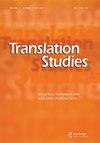Cultural translation and the immigrant artist: Zoya Cherkassky-Nnadi’s works in context
IF 2.2
2区 文学
0 LANGUAGE & LINGUISTICS
引用次数: 0
Abstract
ABSTRACTGrounded in contemporary translation studies, this article offers insights into the way translation links with multimodality and art to display the experience of migration. Its main contribution to the discipline is exploring these issues from the perspective of cultural translation – a concept that applies to the transformation of individuals and entire groups when they encounter otherness. Our case study is a selection of works by the Israeli artist Zoya Cherkassky-Nnadi who emigrated from Ukraine to Israel during the mass immigration from the former Soviet Union in the 1990s. In her art, which reflects a navigation between conflicting identities, she articulates the experience of “translated” women and men (to use Salman Rushdie’s coinage). While examining her works through the prism of cultural translation, we explore several issues: the manipulation of stereotypes of the “other”; the transformation of people, especially in relation to immigration; the involuntary sharing of space; and hybridity.KEYWORDS: Zoya Cherkassky-Nnadiimmigrationmultimodalityartcultural translationhybridity AcknowledgementsWe are grateful to Zoya Cherkassky-Nnadi and to Rosenfeld Gallery, Tel Aviv for permission to include the artist’s works in this article. Alex Moshkin has kindly given his consent to quote his translation of Rita Kogan’s “Atsey ashu’akh lo” (Fir trees aren’t).Disclosure statementNo potential conflict of interest was reported by the author(s).Notes1 Bhabha refers to the earlier translation by Benjamin (Citation1968).2 The name Nnadi was added following her marriage to Hyacinth Obinna Nnadi.3 See, for example, New Barbizon. Accessed August 27, 2023. https://newbarbizon.wixsite.com/new-barbizon/blank4 See Lemish (Citation2000) for the connection between the hair color and the stereotype.5 From the point of view of the receiving country, all the immigrants from the FSU are regarded as “Russians”.6 The similarities between the immigrants’ life before and after the immigration are highlighted in Cherkassky-Nnadi’s diptychs which were part of the “Pravda” exhibition (Kohn and Weissbrod Citation2021).7 From Yana Pevzner Bashan’s blog. Accessed August 27, 2023. https://www.mako.co.il/video-blogs-weekend/Article-0cbc0be76522c71026.htm8 Humor is created by incongruity between elements that coexist simultaneously (Veatch Citation1998), in this case – the two shops facing each other; while irony also involves criticism (Hirsch Citation2011).9 Collectio Judaica, Rosenfeld Gallery. Accessed August 27, 2023. https://rg.co.il/exhibition/collectio-judaica/10 For his artistic creation, see Perloff and Reed (Citation2003). For his influence on Cherkassky-Nnadi’s Haggadah, see Dashevski (Citation2021).11 Dashevski (Citation2021, 96) notes that the birds in the Aachen Haggadah resemble ravens, and traces the sources of this anti-Semitic image.Additional informationNotes on contributorsRachel WeissbrodRachel Weissbrod is Professor Emerita at the Department of Translation and Interpreting Studies, Bar-Ilan University. Her areas of research include translation theory, literary translation into Hebrew, audiovisual translation and adaptation. She has published in Target, The Translator, Meta, Babel, Journal of Adaptation in Film and Performance, and other journals. Her book Not by Word Alone – Fundamental Issues in Translation (2007, in Hebrew) was published by the Open University of Israel. Her recent books, coauthored with Ayelet Kohn, include Translating the Visual: A Multimodal Perspective (2019), and Multimodal Experiences Across Cultures, Spaces and Identities (2023).Ayelet KohnAyelet Kohn is a Senior Lecturer in the Department of Communication at David Yellin Academic College in Jerusalem. Her research focuses on multimodality in media texts and on communities in the internet. She has published in Visual Communication, Visual Studies, Computers in Human Behavior, Jewish Quarterly Review, Journal of Israeli History, Social Semiotics, Convergence, and other journals. Her recent books, coauthored with Rachel Weissbrod, include Translating the Visual: A Multimodal Perspective (2019), and Multimodal Experiences Across Cultures, Spaces and Identities (2023).文化翻译与移民艺术家:语境中的卓娅·切尔卡斯基-纳迪作品
摘要本文立足于当代翻译研究,探讨了翻译如何与多模态、艺术相结合来表现移民体验。它对这门学科的主要贡献是从文化翻译的角度来探讨这些问题——文化翻译的概念适用于个人和整个群体在遇到他者性时的转变。我们的案例研究是以色列艺术家卓娅·切尔卡斯基-纳迪(Zoya Cherkassky-Nnadi)的作品选集,她在上世纪90年代前苏联大规模移民期间从乌克兰移民到以色列。在她的艺术中,反映了冲突身份之间的导航,她清晰地表达了“被翻译”的女人和男人(用萨尔曼·拉什迪(Salman Rushdie)的话来说)的经历。在从文化翻译的角度审视她的作品时,我们探讨了几个问题:对“他者”刻板印象的操纵;移民:人的转变,尤指与移民有关的;不自觉地共享空间;和杂种性。感谢Zoya Cherkassky-Nnadi和特拉维夫罗森菲尔德画廊允许我们在本文中包含艺术家的作品。Alex Moshkin好心地同意引用他翻译的Rita Kogan的“Atsey ashu’akh lo”(杉树不是)。披露声明作者未报告潜在的利益冲突。注1 Bhabha指的是本雅明早期的译本(Citation1968)Nnadi这个名字是在她与Hyacinth Obinna Nnadi结婚后添加的。2023年8月27日访问。https://newbarbizon.wixsite.com/new-barbizon/blank4见Lemish (Citation2000)头发颜色和刻板印象之间的联系从接收国的角度来看,所有来自前苏联的移民都被认为是“俄罗斯人”Cherkassky-Nnadi的双联画是“真实感”展览的一部分(Kohn and Weissbrod Citation2021),突出了移民前后生活的相似性来自Yana Pevzner Bashan的博客。2023年8月27日访问。https://www.mako.co.il/video-blogs-weekend/Article-0cbc0be76522c71026.htm8幽默是由同时共存的元素之间的不协调创造的(Veatch Citation1998),在这种情况下-两个商店面对面;而反讽也包括批评(Hirsch Citation2011)犹太收藏品,罗森菲尔德画廊。2023年8月27日访问。https://rg.co.il/exhibition/collectio-judaica/10关于他的艺术创作,见Perloff and Reed (Citation2003)。关于他对切尔卡斯基-纳迪的《哈加达》的影响,见Dashevski (Citation2021)Dashevski (Citation2021, 96)指出,亚琛哈加达中的鸟类与乌鸦相似,并追溯了这种反犹太形象的来源。作者简介rachel Weissbrod是巴伊兰大学翻译与口译研究系的荣誉退休教授。她的研究领域包括翻译理论、希伯来语文学翻译、视听翻译和改编。曾在Target、The Translator、Meta、Babel、Journal of Adaptation in Film and Performance等期刊发表文章。她的著作《不是单靠文字——翻译中的基本问题》(2007年,希伯来语)由以色列开放大学出版。她最近与Ayelet Kohn合著的书籍包括翻译视觉:多模式视角(2019)和跨文化、空间和身份的多模式体验(2023)。Ayelet Kohn是耶路撒冷大卫耶林学院传播系的高级讲师。她的研究重点是媒体文本和互联网社区的多模态。她曾在《视觉传达》、《视觉研究》、《人类行为中的计算机》、《犹太季刊评论》、《以色列历史杂志》、《社会符号学》、《趋同》等期刊上发表文章。她最近与蕾切尔·韦斯布罗德合著的书包括《翻译视觉:多模式视角》(2019)和《跨文化、空间和身份的多模式体验》(2023)。
本文章由计算机程序翻译,如有差异,请以英文原文为准。
求助全文
约1分钟内获得全文
求助全文

 求助内容:
求助内容: 应助结果提醒方式:
应助结果提醒方式:


